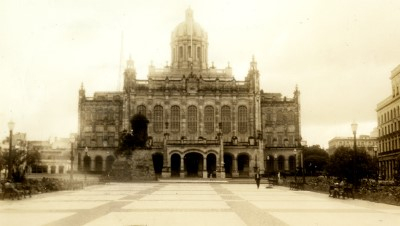 On March 13, 1957, in one of the boldest actions of the anti-Batista rebellion, a group of forty men stormed the presidential palace in the center of Havana and almost succeeded in killing Batista. A rapid flight to one of the upper floors of the palace and opportune reinforcements saved his life.
On March 13, 1957, in one of the boldest actions of the anti-Batista rebellion, a group of forty men stormed the presidential palace in the center of Havana and almost succeeded in killing Batista. A rapid flight to one of the upper floors of the palace and opportune reinforcements saved his life.
The Student Revolutionary Directorate, together with several Autentico leaders, planned to overthrow the government by assassinating Batista. Student leaders reasoned that such fast, decisive action would cause the regime to crumble and prevent unnecessary loss of life in a possible civil war.
Despite the audacity of the assault, the strong palace defense held out. The poor quality of the attackers’ weapons, and the failure of a second group to arrive turned possible victory into costly defeat. According to the official government report, twenty were killed, including five members of the palace guard. That figure, however, did not include the many conspirators whom the police hunted down and killed after the event.
While the palace attack was going on, a group led by Jose Antonio Echeverría, head of the Directorate, stormed a Havana radio station. Unaware of the failure at the palace, the students broadcast an announcement that Batista had been killed and his regime brought down. Their joy was short-lived. Minutes later, the police shot and killed Echeverría and wounded several other students.
Fidel Castro, from his hideout in the mountains, criticized the students’ attack. In a taped interview shown in the United States in May, Castro called it “a useless waste of blood. The life of the dictator is of no importance. Here in the Sierra Maestra is where to fight.” Throughout his stay in the mountains, Castro opposed a military coup, the assassination of Batista, or any other violent act by a group not directly under the control of his 26th of July Movement.
Another group that spoke against the attack on the Presidential Palace, was the Partido Socialista Popular (Cuba’s Communist Party). The head of the PSP, Juan Marinello, wrote to the United States journalist Herbert L. Matthews on March 17, 1957, explaining the official party line: “In these days, and with reference to the assaults on barracks and expeditions from abroad – taking place without relying on popular support – our position is very clear: we are against these methods.” The Communists advocated, as the correct strategy against Batista, a mass struggle based primarily on the mobilization of the proletariat and leading toward national elections. They called for the creation of a Democratic Front of National Liberation to form a government representing the workers, peasants, urban petite bourgeoisie, and national bourgeoisie, all under the leadership of the proletariat.
Th PSP leaders, however, were following a dual strategy. While publicly advocating peaceful opposition to Batista, they were secretly making overtures to the insurrectionary groups for closer collaboration. They apparently believed they could eventually dominate the Federation of Cuban Students and neutralize the Revolutionary Directorate. But no union emerged out of the Communist contacts with the students. Echeverría and other student leaders were not ready for an alliance with the Communists and went ahead with their plans.
Throughout most of Batista’s rule, the Communists had enjoyed virtually complete liberty; several of them even held minor posts in the government. Batista took certain measures against the PSP, principally to appease the United States government. These were few, however, compared to the persecution suffered by the non-Communist opposition. The PSP consistently sought to undermine, infiltrate, and control the groups combating Batista. The importance of the Directorate as a dangerous rival for power and the militant anti-Communism of several of its leaders were constantly present in the minds of the top members of the PSP.
The defeat suffered at the palace and the death of Echeverría, at the time perhaps the most popular figure opposing Batista, left the Directorate leaderless and disorganized. Almost a year went by before the organization recovered from the blow, and even then it never regained the prestige and importance it had enjoyed prior to the palace assault. While the Directorate declined, Castro, unchallenged in the mountains, grew in prestige, strength, and following. He gained adherents in the cities and won to his side many discontented elements who, whatever differences they might have had with his 26th of July Movement, found no other insurrectionary organization to join.








